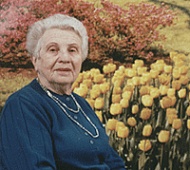Archived site
Read only

Sima Preminger
Fathers name: Shimshon Zigelniker
Mothers name: Sonya Davidovitch
Year of birth: 1916
Romania, Siberia (USSR), Israel
Brothers/sisters: Yechiel
Studies: Scholl of Nurses, Yassi, Romania
Profession: Nurse
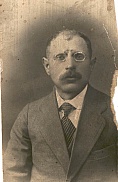
Sima's father, Shimshon Zigelniker
I was born in a blessed piece of land; Baseravia, which at the time belonged to the Russian Empire. After the Russian revolution in 1917 our region was attached to Romania. In school we learned Romanian, my father tought me Russian. He was born in Odessa and my mother came from Kamints-Padolsk.
They settled in Baseravia because my father was a wine expert and our village "Shabbo" was celebrated for its vineyards and wines since the times of Great Katerina the 2nd.
My brother Yechiel was 4 years younger than me. We lived in a large house with tall French windows and glass balconies, surrounded with fruit trees and a vegetable garden. With my childhood friend Zila Veller we used to play in the tree shade. From pumpkins leaves we made ourselves umbrellas and with coils of thread tied under our bare feet we created shoes, and so we walked around like two fancy ladies. It was a happy and careless childhood which unfortunately my children did not get to have. They grew up in poverty and in the harsh conditions of Siberia.
End chapter 1
Studies
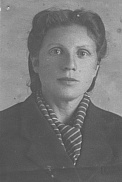
Sima at 17
When I finished high school the question arose what to do next. Yechiel my brother studied medicine, but he was failed again and again by an anti-Semitic professor, so he had to leave to complete his studies abroad. The expenses of his studying in Italy were heavy on my parents and they could not afford to pay tuition for another student. They argued that higher education is not necessary for a girl.
I was bored at home and after many inquiries I found a school for nurses in Yassi which accepted Jewish students, and belonged to the state, so it was free. My parents were against my studies but I was very stubborn and they eventually gave up. I was the only Jewish student in school. The studies were hard: very rigid discipline and long days. Many times later in life I was thankful for this harsh training.
In the course of our studies we did practical work in the local hospital. Once we received a patient who was a priest with a case of pneumonia and high fever. At the time there were no antibiotics and the only treatments available were cold compresses every two hours and Camphor injections. Thanks to my persistence with the treatment, within a month the priest recovered. He was very grateful and so he showed up in the school with chocolates and flowers. But we had very strict rules: no presents from the patients, so he went to the director's office and asked her if he could take me to the movies. The director agreed and the priest came to see me a few more times. The girls in the school found out that I had a priest-suitor. I did not know how to tell him that I was a "Jewdenka", as they called us back then. Eventually, the director decided to call the priest to her office for a chat. After that chat the priest never showed up again, but the nickname "Priest's wife" stuck with me for the duration of my studies.
After school I was accepted to work in a maternity hospital in Chernovits. In Chernovits I met Emil, who in 1938 became my husband and shared with me most of my life memories.
Emil came from a wealthy family -- the owners of a large electricity shop in town. I lived like the rich for a short period. Emil's mother sent me to their tailor (at the time every person who respected themselves had a personal tailor) who dressed me from head to toe. Each day I wore a different suit or a dress and a hat.
In 1939 I got a telegram from my brother.
"Come home," it said.
I knew that my father suffered from Emphysema for a long time, and I knew why I needed to come. We sat by his bed day and night. Yechiel injected him with Morphine to ease his pain. My father died in bed surrounded by siblings and relatives. Maybe that was for the best. My mother's faith was scarier.
End chapter 2
War
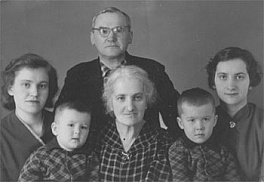
Emil's sister, Clara, her husband and 4 kids: Lilya, Mira, Kostya and Sasha.
In 1940 the Soviets government gave King Michay in Romania an ultimatum: surrender the regions of Baseravia and Bukovina to the USSR, or prepare for war. The king prefered to surrender. We, the cizitens, got two weeks' notice. The family gathered to discuss the situation: stay in place with Russian rule, or move to Romania. The Romanian people returned to Romania, but the Jews had nowhere to go: in Romania the Nazis were already in power. Wealthy people such as the Premingers understood the Soviets were not going to treat them well.
Emil had 3 sisters and a brother. Emil's sister Toldy, with her husband and little girl, crossed the border to Romania. All they took with them was a bag with their valuables. They arrived to Bucharest, where Emil's sister Lutzi lived, and together managed to embark on the last ship to Palestine.
Nathan, Emil's brother, who until then enjoyed a laid back life style -- chess clubs and coffee shops -- stayed in Chernovits. He was caught later by the Nazis and was shot together with his wife and young boy.
Clara, Emil's third sister, arrived to Chernovits with her husband and two kids and ended up in Siberia with us.
When the soviet troops entered, they made everyone get special identification cards with an "Occupation" clause. Who are you? A merchant? A factory owner? Etc. Large business owners were immediately arrested. Shop owners were forced to give over the shop keys and surrender the contents. That's what happened to the Preminger family.
I was already pregnant at the time. The Preminger house was very crowded, with Clara's family present. I decided to go back to Shabo for the pregnancy period, to be with my mother who lived there alone in the big house.
Emil came to be with me. We called our son "Shimshon," in memory of my father.
We were advised to stay in Shabo, because Chernovits became such a hostile place for Jews and business owners: there was no telling what the Soviets' next step would be. But the authorities did not permit Emil to stay in Shabo, and so the baby and I joined him in Chernovitz. My mother walked us to the train station in tears. It was a farewell for good. I never saw her again. That was our first deportation.
Once the war started Yechiel, my brother, was recruited immediately by the Russians. His wife and son and my mother fled to Odessa, joined by relatives, nieces and nephews from my mother's family; 13 people altogether. They were in Odessa when the Romanians entered. If in other places there were distinguished places were the Jews were shot, like Baby-Yar and Transnistro, in Odessa nobody knew where they were killed. The whole family was taken and we don't know until this day where they are buried.Only memories remain.
For "Humanitarian Reasons" the only people they did not take right away were Ester and her son, because she was pregnant. After the birth the soldiers came to take her too. She held her newborn baby in her arms and her 3 years old son by his hand, and followed the soldiers.
Ester's boy had a pair of warm winter shoes of good quality, which she gave to the Superintendent's boy before she left.
"My son is not going to need them anymore". She said.
By the end of the war, out of 20 Jewish families in Shabo, nobody survived. All were taken to the fields and shot. Their properties were taken by the new settlers the Romanian brought.
Back in Chernovits, Emil found a job as an electricity engineer in a tram garage. I stayed at home, taking care of little Shimshon.
End chapter 3
Voyage to Siberia
At sunrise on the morning of June 13, 1940, two soviet men with uniforms knocked on our door. They told us we had 2 hours to pack. We asked where they were taking us, and they told us the government had decided to move us away from the border. One soldier left and the other stayed to supervise the packing. He whispered to me from the corner of his mouth, "Better pack some warm clothes."
Everybody was in a panic. What to take? And what about our elderly parents? What about the baby? Shimshon, 2 months old at the time, lay in his crib, crying his lungs out.
The first soldier returned with a wagon and we were taken to the train station. The sun had just risen and we saw many wagons, all over the city, with people like us, being led to the train.
They packed us in freight cars. On both sides there were wooden bunks and in the middle a hole for the restroom. There were 5 families to one wagon. A Lady called Mrs. Aris was also with us. She flipped out and kept running around, yelling "Dr. Aizekovitch! Dr. Aizekovitch!" I was afraid she would harm my baby.
We were on the road for two weeks. At stations they brought us 2 buckets. One was filled with a muddy liquid and the other with a strange thick red liquid. We did not know what the red liquid was so we poured it down the toilet hole. Later we found out it was a berry broth and we were deeply sorry. We also got moldy Rye bread which we couldn't eat. Luckily Shimshon was mostly breast-fed. At stations, I would show my baby to the women on the platform and they gave me milk in exchange for the bread. In other stations, children approached to beg us for food...
When we arrived at our destination, the village of Mishkovo near Novosibirsk, they placed us in an empty school. Each family got their own spot on the bare floor. They made us sign papers consenting to our deportation for 20 years. Some of us laughed -- the Soviets think their regime is going to last 20 years... Unfortunately it did.
After a few days we were moved to the river. The elderly and babies were placed on wagons; the rest of us walked. We sat on the river bank and waited for a barge, but it did not show up. Night came and it got cold. We covered ourselves with whatever we had.
In the morning a barge for grain transportation arrived and we got on it. There were 800 people on board. A dysentery epidemic broke out because we drank water from the river. Emil's grandmother, who became sick, went to the toilet in the back of the barge and fell into the water. Luckily someone saw it and saved her.
At nights the mosquitoes tormented us. We were situated on the deck, so there was nowhere to hide. Nobody could sleep. We spent a few weeks on that boat.
Then they moved us to a smaller boat, and then to another boat. We were no longer sailing on the river Parbel , but on the river Chizik. The water was shallow and on both banks there was a "Taiga" - the Siberian wild forest.
One day we sat on the roof of the boat. A small group of the Chernovits people. Mr. Mormach, whose family had a small soda factory, had a violin. Melechzon had a flute and his wife had a wonderful voice. We sang "Nocturne," which was a popular Tango at the time. Most of that group of people died soon afterwards. Until this day, whenever I hear that song I cry.
Mormach found a hut in the village where they placed us. A small structure with a roof but no walls, so it couldn't keep any warmth. He was wearing rugs and his worn-out shoes were tied to his feet with ropes. The temperatures outside were typical to the Siberian winter -- minus 40 degrees Celsius. One morning his wife came running up to us: she had woken up and felt his frozen body next to her. His father died soon after that, but the wife and son survived and moved later on to Israel.
End chapter 4
First years in Siberia
The village we were placed at was called Chuzik, like the river. A true no mans land. On one side of the village there were deadly swamps, on the other the river, which was untraversable for any vessel. Even in the winter when the swamps froze no one dared crossing. There were around 20 households. Mostly elderly people, women and children.
Emil, his parents, Shimshon and I were placed in the shack of an elderly couple called Kropnov. In Soviet times you could not own anything, so even the shack that the Kropnovs built themselves did not belong to them. The government could lodge anybody at your place. The Kropnovs themselves -- Russians-- had been relocated to that village by the Soviet regime earlier and they didn't get even a hut: they were left under a tree. We were lucky to get a roof over our heads.
Their place consisted of two small rooms. Emil, his parents and I slept on an improvised mattress in one room, and the Kropnovs slept in the fireplace in the other. There was a bad insect and cockroach problem, so many nights we ended up sitting outside.
Our hosts were good people. I offered Mrs. Kropnov the bag of bread we received on the road (I did not know what to do with it, it was all moldy). Mrs. Kropnov refused to take it. She showed me how to cut out the mold and dry the bread in the fireplace.
"My dear, you are going to miss this bread," she said. We did face many times of hunger later and her words always resonated in my memory.
We lived in Chuzik until the fall and then we were moved to another village called Livovka. We got a room with a woman whose husband was enlisted in the Soviet Army. She gave us her room and slept with her two children in the kitchen. Our room was small and dark. The windows were at ground level. That's were my little Sammy (Shimshon), one year old at the time, started walking.
Once, Sammy put his hand in a boiling soup and it got swollen. The Latvian neighbor gave me some ointment for burns. (There was no doctor or medicine around.)
Sammy couldn't sleep at night because of the pain and I was walking all night holding him in my arms. The windows of our room faced the owner's vegetable garden, and I noticed shadows moving outside. I woke Emil and he woke our landlady. They went out quietly and caught the daughter of the neighbor digging and stealing potatoes. For some time the landlady had been finding uprooted potatoe bushes every morning and when she asked the neighbor about it, the neighbor pointed a finger at us. Potatoes were life itself at that time. Emil held the thief and our landlady was pounding her, shouting "That's to teach you not to tell lies about others, you Cholera."
Hunger was everywhere. Russians and deportees were starving. We used to lie in bed until noon in order to skip breakfast and save energy.
It was not long before we had to move again: the landlady needed the room back. We stayed with another woman for a few months, and then found a place of our own. We bought a Russian bathhouse -- a small shed with a fireplace in the middle and a vegetable garden next to it. As payment we gave the owner our silverware, the only valuable thing we had left. Eighteen pieces of fine silverware for a shed... We thought the owner was crazy, but later it turned out he did not own the land or the vegetable garden, they belonged to the Kolkhoz.
I should explain in a few words what the "Kolkhoz" was. The soviets nationalized everything. They placed people in remote places, where they had to work the land, while the produce was taken by the government. That's why everybody, Russian people too, were starving. All you had to eat was what you grew in your vegetable garden. There were no stores or money because there was nothing to buy.
Our new home, the shed, was all black inside, filled with soot. The roof was made of branches and in the spring the house flooded. Once on a rainy night we couldn't find a dry place. The last dry spot was under Sammy's bed, so Emil's eighty year old father crawled under it to sleep.
In the spring we had weeds growing on our roof, Nettle and Atriplex. We could make a soup out of them, and from the Atriplex, with a bit of flouer, we also made pancakes. Later on we had beets and onions. It saved us. In this second year of our deportation most of us were very weak and had bloody diarrhea. Many of our neighbors and acquaintances had died. Emil was running around in the nearby villages, trying to trade whatever goods we had -- a coat, a pot, shoes -- for a few potatoes. He ran into the governor of the Kolkhoz from time to time, who would ask him, "How is everybody? Still alive?" Surprised by Emil's answer, he would nod his head: "You Brave fellows..." You see: they sent us to our deaths.
Fortunately, we didn't live in our bathhouse for long. Emil managed to get a transfer to the bigger village, Kalpashova, because there was a shortage of electric engineers there. It's a weird idea for us today, that you'd need to ask permission from the government to move, but that's how things were.
I'd like to describe the journey to Kalpashova. Today one just buys a ticket and goes, but it was very different then. The Kolkhoz gave us a lift to the next village on two oxes,. There we had to wait for a man named Totonikov to pick us up with a boat. We waited, started to eat the food we took with us. Totonikov showed up after a week. He took us to the next place, which was a small anchorage near a wood cabin, and just Taiga (Siberian forest) around.
In the first day Emil somehow got us a pumpkin to eat. On the second day we went into the forest to look for berries. After two days another boat came and took us further to a village that belonged to the Kirjacks. The Kirjacks had their own ancient religion and they were not nationalized, so they lived well and had plenty of food. How much we ate there! Boiled potatoes with young peas and melted butter! It was the best food I ever ate in my life!
The next boat brought us to a place called Parable. The river bank was crowded with hundreds of people, mostly recruits on their way to the war. It was 1942 and the war was still going strong. We made a fire on the river bank, and put on a pot with potatoes. A barge passing by in the river made such a huge wave, it carried away our dinner and almost took Emil's father with it. He was an old and fragile man and he burst out in tears
"Why? Why?" He cried. "What is my sin? I never harmed anybody! I never cheated anybody! I don't owe a dime, all my life I worked hard, took care of my family and children... I, myself, grew up in a large, poor family -- I worked for everything I had. I arrived in Vienna barefoot. I finished my studies, worked 25 years as an economist in a power station. With my pension money I opened my own electricity store... Then the Soviets came and took everything... everything..."
When night came I took Sammy and we went into a makeshift terminal close by. I still remember laying there hungry on the floor, hugging Sammy, hundreds of recruiters around, on the spit-covered floor.
The last part of our trip was in a large barge. We were placed on the deck on grain bags. There were girls sitting next to us and they started singing "Sini Platochik" -- "Blue kerchief" -- a famous song at the time. It was the first time I'd heard it. Now it was my turn to break up. The melody reminded me that somewhere there was another life, there was music and maybe happiness... I cried for hours for my trampled youth and for the unknown future we were still facing.
End chapter 5
Kalpashova
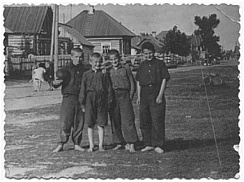
Shimshon, Ossya and friends in Kalpashova
In Kalpashova we first lived with Clara, Emil's sister, and her family. Later we found a room in the apartment of Marussia, a woman with two children, whose husband was enlisted in the war. The apartment was cold and dump. We did not have money for firewood, so we used to collect trees from the woods. When we lit the fire, the walls defrosted and water dripped everywhere. Emil, Sammy and I slept on a single bunk. (Emil's parents lived with Clara for a while.) Sammy got Pneumonia and was sick for a long time. Emil was working in a can factory. He told me that if we didn't leave that apartment, I'd bury him soon.
We got lucky, and a friend of Emil's set him up with a job as porter for a bakery. This saved us from starvation. I sewed large sleeves on Emil's shirts, and he used to hide in them loaves of bread the workers gave him. Even better was the accommodation we got in the farming division of the city's Commerce department. It was a little hut that used to be a horse equipment workshop. The walls and ceiling were covered with tar and soot, but there was a small vegetable garden where I immediately planted potatoes.
Emil used to bring freshly baked Rye bread from the bakery, and he also got coupons for butter and sugar. We weren't going hungry anymore.
When Emil's boss saw how neat I made our hut look, he offered me a job as a cleaning lady at the bakery office. Once in the summer when I cleaned, the window was open, and I heard Sammy, under the window, not letting other kids sit on the bench next to him.
"Why, who are you? The landlord?" the other kids demanded.
"Yes," replied Shimshon."I am. My daddy is a porter and my mommy is the cleaning lady!"
There was a roof over our heads and bread in our stomachs and all that we needed now was to live through the war. But then a different kind of torture started... A worse one.
End chapter 6
The yellow house
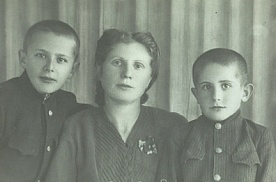
Sima and her sons
Emil got invited to the "Yellow House". The Yellow House was the KGB's office. They wanted Emil to become an informer, to tell them who was a Zionist or other type of criminal. Emil refused: he said he didn't know anybody. It was true: since our friends started to get arrested, Emil went from work to home and back, and did not meet up with anybody. The KGB kept calling him every few weeks. I saw through the window Emil's bent shoulders and dreadful face, walking slowly to the Yellow House.
To get them off him Emil gave them the name of a dead person : in this village lived a Zionist. But they checked the information and found out the Zionist was dead. It is interesting that, at the time, you could not travel without permission from the government, you had to sign in once a week at your local KGB office, and there was no mail service. Still, everybody knew who was dead and who got arrested.
The KGB threatened Emil that there was a law against giving false information, and that the punishment was seven years in the camps. We lived with this threat for eleven years, from 1942 to 1953.
In 1945 our second son, Osiya was born.
In 1948, my brother Yechiel came to visit us and brought us 6000 Rubles.
When Yechiel came back from fighting in the war, he found some papers my mother had hidden before she died. Papers that confirmed our ownership of the house in Shabo and the vineyard. The house was in ruins, but Yechiel managed to get the vineyard back and make some money selling its produce.
With the money we bought a small house and a cow we named "Krasolaka" (Beautiful). Yechiel also brought me a copy of my diploma, so I could work as a nurse in the local Tuberculosis clinic. Emil started working as an electrician. I'll skip a few memories.
1953. Amongst our friends many people got arrested. They were charged with espionage and sent away for 25 years. If you didn't inform on your friends, the KGB would make false charges against you and send you to the camps. This was the choice: ruin your friend's lives or ruin yours.
We had two good friends, Dr. Kats, and Mr. Gaba. The KGB wanted Gaba to tell on Dr. Kats but Gaba refused. The KGB interrogated him again and again, until Gaba hanged himself. He chose to die rather than inform on his friend.
When the KGB was after you, you had no chance. If they couldn't charge you as being "Enemy of the People," they would falsify some other charges. The saying was that all they need for a trial is a body. The KGB would make up the rest.
That was what they eventually did to Emil.
They made up some charges against him, something like he stole a transformer and exchanged it for a wagon of wood. The punishment: fifteen years in the camps. Emil was arrested.
I got a lawyer. She saw immediately that the case did not hold water, but that did not mean much. The trial started but the witnesses gave contradicting testimonies, so it was postponed. A miracle happened then: Stalin died, and the government announced that all criminals would be pardoned... Only the pardon was for people sentenced to up to five years, and Emil faced fifteen years...
The next hearing took place on April 4th, 1953. During the court's recess, at 11AM, another miracle happened: in the news we heard that the "Doctors Trials" were canceled. The "Doctors Trials" were a plot the KGB had organized against Jewish doctors. The "Defrosting Time" started. The atmosphere in the courtroom changed immediately. My lawyer argued that the testimonies in Emil's case were ambiguous. The court decided to close Emil's case and free him.
But that wasn't the end of it. After some time Emil got called in again to the Yellow House, where the manager himself, Fyodorov, told him: "You managed to get away this time, scoundrel Jew, but we'll get you next time".
We didn't know what to do. By a friend's advice, I wrote a letter to the head advocate in Moscow, complaining that the local KGB office was trying to frame Emil because he would not inform on anybody. We waited in terror for the results. They called Emil again to the Yellow House, where Fyodorov told him, "You dared to complain, dirty Jew? You think the trial time is over? You just wait and see..."
End chapter 7
Jambul
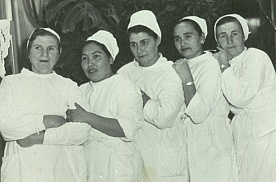
Sima and colleagues at the Tuberculosis clinic
We had an acquaintance in Jambul, Kazakhstan: Dr. Anastas Pavlovitch, a former colleague of mine from the hospital in Kalpashova. He invited us to Jambul. Me as a nurse, and Emil as an electrician. That was the procedure at the time: you had to be invited by a person in your city of destination, in order to get permission to move. In 1957 we moved to Jambul, to the heat and fruit and vegetables.
We left Siberia for good after sixteen years. Sixteen years of registering twice a week at the KGB office.
Again we packed our stuff and went on the road. We got off the train one summer evening. We hired a wagon with a donkey, seated Emil's mother on top of the packages, and we walked beside the wagon.
Not far from the train station we saw a sign: "Half house for sale." We rented a room from this family for about a month, then we rented from another Russian family. They were decent people and they used to give us tomatoes from their vegetable garden, even though they were very poor themselves. The old man used to get bones for dogs in the market and cook soup from them. That was all the meat they could afford.
Emil worked as an electrician again and I as a nurse at the Tuberculosis clinic. The kids went to school. Sammy was in tenth grade and Ossya was in sixth grade.
We were about to buy a house for ourselves when the authorities called us and told us we were free to go. We couldn't believe our ears. In Siberia the KBG's power was still strong, and we hardly got permission to move. Here they were freeing many people, including many Chechnyians and Ingushans who had also been deported.
The question arose: what should we do? Stay or go? We decided to go to Ackerman, former Romania, a village next to Shabo, my native village, where Yechiel, my brother lived.
End chapter 8
Akerman 1958-64
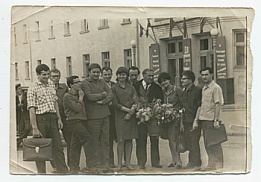
Ossya with his student friends
In Ackerman we first lived at Yechiel's house. He had a big house and a vineyard. When we did not find a place to rent, we decided to build a house by ourselves. We got a section of land outside the city. All the land belonged to the government and they allotted it to people. During the construction we rented a small house from the neighbor where the five of us lived: Emil, me, Sammy, Ossya and Emil's mother who was now eighty-five. Emil's father had died. Yechiel helped us find construction materials, and much of the construction work we did ourselves. It was winter and cold and very crowded in our place, but by the spring we had built ourselves a three room stone house with a wooden porch. We planted trees and vegetables and vines. Emil had a job as an electrician in a hotel that was being built twenty kilometers away.
Sammy was working in a garage and tried to get into the Electrical Engineering program at Odessa University, but failed twice.
Eventually he went to Tomsk, in middle-Asia, where he got accepted to the university without problems. Issy started working as a tinsmith. He wanted to study at the Marine School in Odessa but they made it clear that Jews were not welcome there, so he moved to Tomsk for his studies as well.
In 1964, Emil's mother died and the hotel he worked in was completed. He was out of work, and we were left just me and him in a big house. Our boys were living in poverty in Tomsk. We decided to sell the house and move close to our sons.
End chapter 9
Bishkek
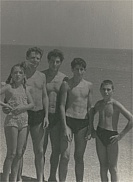
Left to Right: Shimshon, Yechiel, Natasha, Osip and Syoma at the beach in Bugazi
So here we were back in the land we were deported to, but this time voluntarily. We first tried to move to Alma-Ata, a big city where we had a friend, Dr. Kats. He came back from the camps (his friend Gaba did not testify against him but somebody else did) and he settled in Alma Ata with his wife and daughter. Here we came face to face with the Soviet reality. We wanted to buy a house, but you couldn't buy a house unless you were registered with the authorities. On the other hand, you couldn't register with the authorities if you didn't have an address.
We went back to Jambul where we'd lived before, but we couldn't get jobs there. Everything had changed. A friend advised us to go check out Bishkek, the capital of Kyrgyzstan, a big city with several higher education institutions.
We arrived in Bishkek in the evening and wanted to find accommodation at the Kolkhoz house, because we did not know anybody. The Kolkhoz house was the only hostel in town. At the time there were no hotels -- hotels hosted only government people.
The Kolkhoz house was full, we were told. We did not know what to do. Outside in the park we could get arrested.
I went to a nearby post office and told the clerk our situation. She took pity on us and told me to come back at the end of the day, at 6PM. She took us to a small and dirty room with just a sofa and we were very grateful. Emil did not feel very well, he felt very tired from the road. His heart had been a problem for some time. In the middle of the night there was banging on the door and a woman shouting that she wanted her knife back. Emil, half asleep, was terrified. He thought somebody was coming to slaughter us. I don't know how, but I went to the Kolkhoz house at 3 AM and begged the manager to take us in. I also slid under the table 25 Rubels, so she let us stay.
The next day we found a room in an old lady's apartment. We stayed there until we found a small house with a garden not far from the city center. I went to work in a Tuberculosis clinic and Emil worked as an electrician. The property prices in Bishkek were very cheap, compared to the prices in Ackerman, so we bought a house with half of our money and with the rest we helped our two sons.
Ossya left his studies in the third year and worked at a few temporary jobs: as a firefighter, as a handyman in a seismological station in the mountains, and others. One of his jobs took him to Lake Sikul, in the mountains, and there he met his future wife Tanya. She was on a school trip from her studies at the Art Academy of Moscow. Ossya went back with her to live in Moscow.
Our sons were not next to us again. In 1969 Emil and I both retired. Emil was tired and sick and he wanted to go home. "Home" he called the place he grew up in: Chernovits, Ukraine.
End chapter 10
Chernovits again
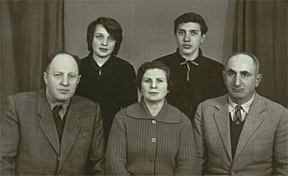
Emil and I, Yechiel and his 2 kids Syoma and Natasha.
Upon our arrival we stayed at the house of our friends Fima and Sally Zinger. Emil met an old acquaintance in the street who was happy to rent us a beautiful apartment with gas heating and a mountain view. She filled out the forms we needed to get registered. We went to the authorities to register. The director of the office did not like our papers because he saw we had come from Siberia. He directed us to another office: to the KGB.
At the time of Khrushchev rule, the KGB got weaker, but now there was a new president, Brezhnev, and the KGB was strong again.
In the KGB's office they told us they could not approve our residence in Chernovits and the matter would have to be decided by the district administration. We waited for months for the administration's decision. Meanwhile, neither I nor Emil were getting our pension money. Eventually we were told to go back to the KGB office.
So there we were again, sitting with Colonel Boginin.
He asked why we were back in Chernovits when we were deported from the city, and I said that what happened more than twenty years ago is now regarded as a mistake and personality worship.
"Yes," he said, "nowadays they like to blame Stalin for everything."
He was reading our file and I recognized my letter of complaint to the Moscow head advocate from seventeen years earlier. I saw Colonel Boginin comparing the handwriting on the forms and on the letter. I saw in his eyes what he was thinking: "Time passed but here we are again. You fell in our claws!"
Two days later we got an order to leave the town of Chernovits within forty-eight hours.
End chapter 11
Riga 1970-72
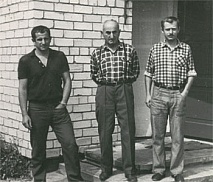
Emil, Ossya and Shimshon
Kramer, a friend of us from Siberia, advised us to come and live in Riga, Latvia. He was also originally from Chernovits and after ten years in the camp he settled in Riga, now an open city where if you had an apartment, it was easy to register.
We found a house suitable for our needs and within our means, but registering wasn't as easy as promised. It took ten months and some bribe money to complete it.
We had a few quiet months. Tanya Jr., Ossya's two year old daughter, stayed with us for a few months. We took many walks in the forest to the stream. Tanya liked to throw stones in the water and watch the circles spread.
One day when I was feeding Tanya a stranger knocked on our door and began asking questions. Why weren't we registered for such a long time? He said he was from the Ministry of Interior office, but I knew he was KGB.
This incident was the last straw. They were after us again. We couldn't take it anymore.
In 1971 we got an invitation to come to Israel from Luzy, Emil's sister. (In order to leave the country you also needed invitation.) We applied to leave but our application was denied. Sammy was also trying to leave and he joined a Zionist group protesting against the denial of exit certificates.
In the winter of 1972, a stranger knocked on our door and asked if Sammy Preminger lived there. We confirmed. The government official gave the three of us an order to leave the country within ten days.
Emil, who had been suffering from heart problems for years now, completely broke down. Ten days to sell the house, organize all the papers, buy goods! You were not allowed to take money out of the USSR, so we were running around trying to buy goods. Stores were almost empty since many Jews were allowed to leave at the time- the authorities were "Cleaning" Russia from Jews before Presidents' Nixon's visit.
We were on the train to Moscow. Yechiel came to say goodbye. It was the last time I saw him. He dreamed of a time when anyone would be able to get on a boat in Odessa and sail to Israel. He would never know that in 1990, after his death, his second wife and family would move to Israel. (His first family died by the Nazis.)
Ossya accompanied us until Brast, the Polish border. We kissed him goodbye just before we went into the custom checkup. The custom lady saw how we huged each other and cried, and said, "What are you doing? Why are you leaving? No one is chasing you!" And I thought to myself, "Woman, what do you know..."
We thought it was a farewell forever.
End chapter 12
Israel
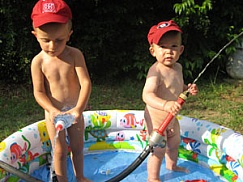
My grand-grand children: Uri and Sean
We arrived in Israel. I expected to see only desert and stones but was pleasantly surprised to see a lot of green. We were given an "Ulpan," accommodation, and a Hebrew language school. There was plenty of food. We found new friends.
After five months we rented an apartment in Bat-Yam. Sammy started working for an electricity company. We sent an invitation to Ossiya and his family to come. We were afraid it wouldn't suffice because Tanya needed written consent from her parents to leave. By this time they had three daughters: Tanya Jr., Sonya, and Lea.
I found a job as a nurse at a mental institution. It was hard work and I still struggled with the language. According to the law, if I worked for ten years, I would be entitled to a pension from the state of Israel. So I worked in this hospital from age 56 to 66.
Ossya, Tanya and the kids got permission to immigrate and arrived in Israel.
In 1973 The Yom Kippur War broke out and Sammy and Ossya got drafted. A few days after the war ended, we sat at the kitchen table and listened to Sammy's war stories. Emil did not feel well. That night he vomited and Sammy ran to get an ambulance (we did not have a phone.) By the time Sammy came back, Emil was dead. Thus ended his hard life.
Now, in 2009, I look back at my life memories and I can't believe I survived it all. I'm remembering of all the wonderful people I met along this long road: The Tsiferblats, The Abramowitzes, The Vellers, The Zingers, Ella Minsk, The Fors, The Weismans and so many more wonderful people.
I live at a nice and calm elderly home. Shimshon has 3 sons and Ossya has 4 daughters which gave me three grand-grand children. So far.
End chapter 13
|
|

